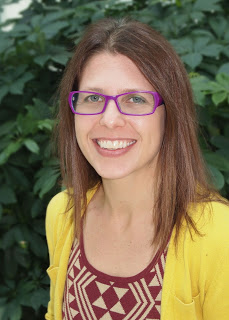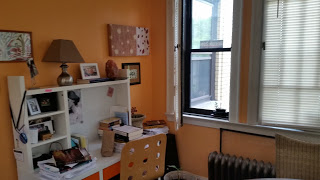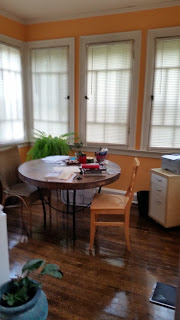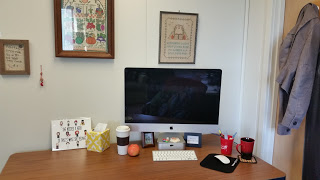I am Jenny Lendrum and This is How I Work
 Today, I have the pleasure of interviewing Jenny Lendrum for the “How I Work” series. Jenny is a PhD candidate and Rumble Fellow in the department of sociology at Wayne State University in Detroit, MI USA. She is currently conducting an ethnographic study in Detroit, analyzing gendered mechanisms operating in the neighborhood and their effects on the informal economy. She is one of the managing editors of Gender & Society. She is an avid marathoner in her spare time.
Today, I have the pleasure of interviewing Jenny Lendrum for the “How I Work” series. Jenny is a PhD candidate and Rumble Fellow in the department of sociology at Wayne State University in Detroit, MI USA. She is currently conducting an ethnographic study in Detroit, analyzing gendered mechanisms operating in the neighborhood and their effects on the informal economy. She is one of the managing editors of Gender & Society. She is an avid marathoner in her spare time.
General: I am a third year PhD candidate in the department of sociology at Wayne State University in Detroit, MI USA. For my dissertation, I am conducting a qualitative study into the work primarily women are doing in one neighborhood in a large urban city. I have taught an introductory sociology course for the past two years at Wayne State.
Current Job: I am one of the managing editors for Gender & Society. I received a Thomas C. Rumble University Graduate Fellowship for the 2016-2017 year. The fellowship grants me the time to continue my data collection, conduct concurrent analyses, and write. I also teach English as a Second Language (ESL) part-time to expatriates seeking to master the language while assimilating to American culture.
Current Location: Detroit, MI USA
Current mobile device: Droid.
Current computer: Asus laptop (windows).
Can you briefly explain your current situation and research to us?
I have been conducting an ethnographic study in Detroit since the summer of 2014. This includes participant observations in the “field” (the neighborhood I am studying) and involves spending large chunks of time in the neighborhood, attending community meetings, walking around, engaging in informal and more formal conversations throughout various neighborhood spaces. During these observations, I make a lot of notes (called “fieldnotes”) and take many pictures (I primarily use my Droid for photos). I spend my field days conducting interviews and observations followed by extensive and laborious write-up of notes. On non-field days, I spend time writing and analyzing data as well as engaging with various bodies of literature. Though observations have been the primary source of data collection during the last two years (approximately 200 field hours), I also conduct more formal, structured interviews with people in the neighborhood. Thus far, I have conducted over 40 interviews with men and women who live and/or work in the neighborhood. I expect to be in the field for another several months following by analysis and writing.
What tools, apps and software are essential to your workflow?
I use a Sony ICD-SX712 Digital Flash Voice Recorder to record my formal interviews and occasionally my recorded fieldnotes. During the transcription process, I rely on the Olympus AS-2300 PC Transcription Kit. I use NVivo Qualitative Data Analysis software to analyze the data in a single accessible space. The program works well in that it allows for various types of analysis of the data including photos, hard-copy documents from the field (such as community flyers and business cards), transcribed interviews, and fieldnotes. I use google calendar to stay organized though I am constantly on the look-out for more efficient organizing tools.
What does your workspace setup look like?
I am fortunate that I have multiple work-spaces.
I have a home office with windows along three of the walls that provide access to a lively and walkable city street below. I primarily utilize my home office for heavy reading and writing days. I also use this as a shared space with colleagues as my home office is within a ten-minute drive from campus.
 |
| Home office |
 |
| Working at home |
I have a shared office at WSU that allows for daily access to faculty and colleagues in a space that facilitates intellectual conversations about our research. I prefer to work in this office during early mornings as it’s generally pretty quiet at these times. Because I am a morning person, it has become a productive spot. Bonus: I also have access to the printer/copy machine which helps when printing out stacks of journal articles and teaching materials.
Lastly, I have a shared office at Oakland University (OU) which houses the current editorship for Gender & Society. This space is shared with other feminist scholars and allows us to share literature, theoretical and methodological ideas, etc. in a dynamic and fierce space.
 |
| OU office |
I alternate between these spaces as well as a favorite local coffee shop. I find that during times of heavy writing, I prefer to be in a public place with some background noise and ordinary life activities.
What is your best advice for productive academic work?
Tapping into available resources. This includes both inside and outside of the institution you’re affiliated with as well as resources through various networks. Accessing others’ knowledge and expertise in complementary disciplines and areas of expertise has been extremely useful for the sharing of intellectual ideas and information.
Most recently, a colleague shared this one that has stuck with me: “Get thy shit together!”. This quote is now a visible note in my offices. It reminds me to stay focused and disciplined.
Lastly, I track my hours spent doing various types of work related to the dissertation. This logging helps to visualize and make tangible my progress.
How do you keep an overview of projects and tasks?
I must admit, I am old-school in my daily habits. I use post-its regularly in my car and in my various office spaces. I find the act of jotting down hand-written notes helps me to remember and forces my brain to consider questions and conceptualizations in ways I might not consider typing these same notes. Though I must also confess, I, on occasion, lose, forget, or misplace these scattered post-its. Despite these drawbacks, I continue to find this method does work best for my working style.
I also, though irregularly, use OneNote to keep ideas, notes, and literature. I continue to battle with centralizing this information. For now, google calendar picks up some of the slack.
Which skill makes you stand out as an academic?
The rigor I use in my fieldwork helps me differentiate myself from others. While there have been many challenges throughout two years of fieldwork, I have begun to view myself as a strong and impassioned researcher. Because ethnographic research is a lengthy process (from establishing rapport in building and maintaining relationships to the recruitment and interviewing processes to the writing and analysis of pages and pages of fieldnotes and transcriptions), I have learned to be patient and dedicated to this project. I feel grateful to be a part of research I am so strongly connected to intellectually and personally.
What do you listen to when you work?
Some days I use websites that play background white noises (for example: http://soundrown.com/). Other times, I listen to celtic music or heavy metal (depending on the type of writing I am doing at the time). When I am in the midst of heaving reading and writing, I work in silence with my earbuds in to block out exterior noises and distractions.
What are you currently reading?
I am currently reading: “Super Sad True Love Story” by Gary Shteyngart; “Catch-22” by Joseph Heller; “Rivethead: Tales from the Assembly Line” by Ben Hamper; and “Thug Kitchen: The Official Cookbook: Eat Like You Give a F*ck” by Thug Kitchen (to experiment with new recipes).
I read in the evenings when I am not pushing deadlines. I also keep several books in my car so that when I find myself with downtime, I can utilize it well by reading one. Some nights I only read a page or two before conking out.
Are you more of an introvert or extrovert?
I identify more as an extrovert and find myself working in spaces that include more interactions or the potential for random interactions. I like the uncertainty of social spaces and the possibilities of conversations and the intellectual sharing of information. Some weeks, I have spent > 20 hours writing at my usual table of my favorite local coffee shop. That said, I do enjoy and appreciate my cozy Detroit apartment at the end of long workdays.
What’s your sleep routine like?
I sleep long and hard. I usually aim for 7-8 hours of sleep per night. I find I am far more productive during the early morning hours. As such, I have extreme (so I’ve been told) sleep habits that sometimes mean I am asleep before 9pm. I also enjoy occasional sleep marathons that may look more like 12-14 hours. Because I am well aware of the many horror stories of fatigue and insomnia (related graduate work), I am grateful sleep has been my refuge.
What’s your work routine like?
I aim to work in hour-blocks hovering around 4-6 hours in the early morning hours. During deadline heavy periods, I also return to work in the evenings, but this looks more like 2-4 hours. On an ideal workday, I do my best to write in the mornings and edit/read in the afternoons. I supplement my work schedule with running, preferably in the early mornings, but the summer months offer more opportunities for evenings runs.
What’s the best advice you ever received?
“Be your own advocate.” You know, intuitively, the best route to successfully get through graduate school. Follow it, create your own path.
